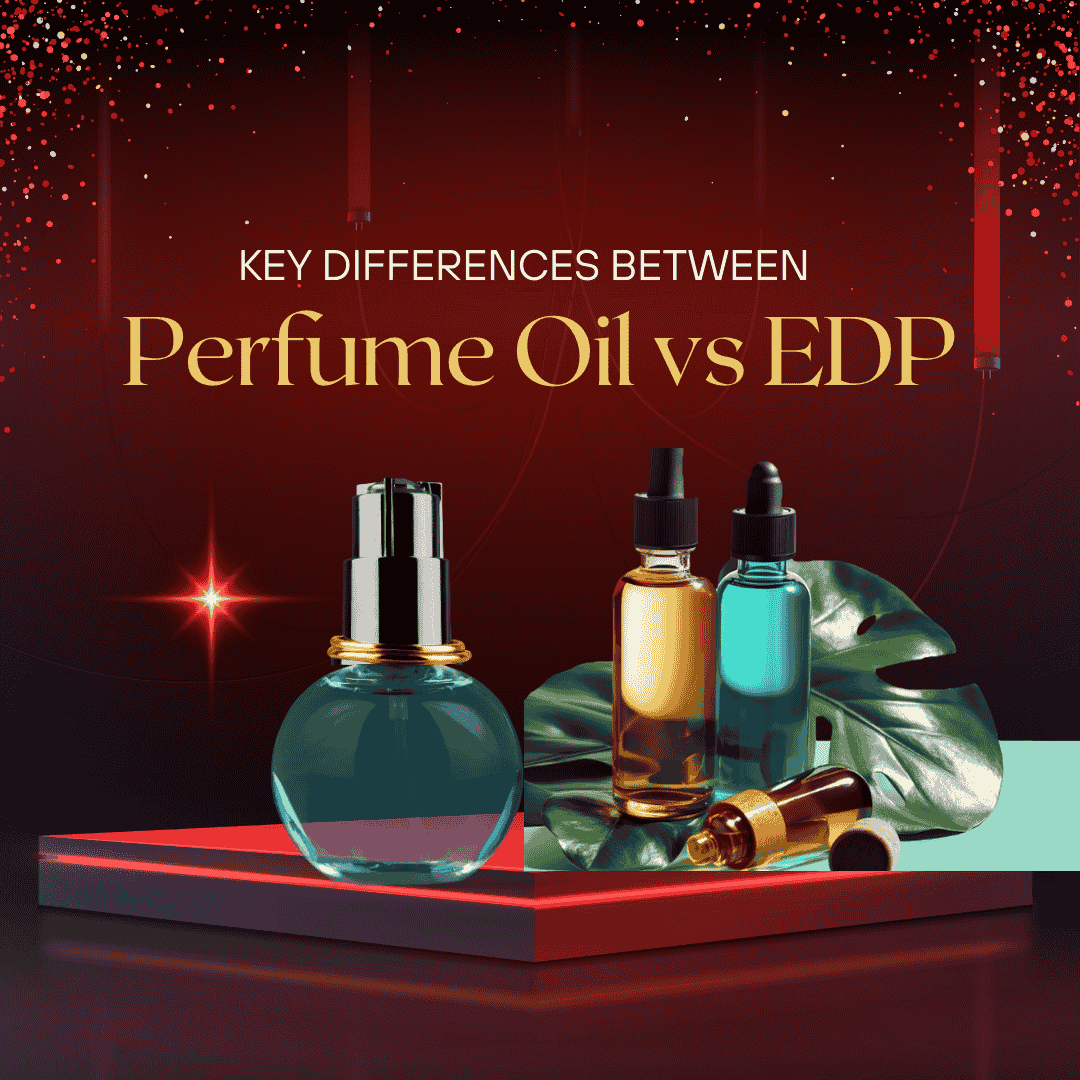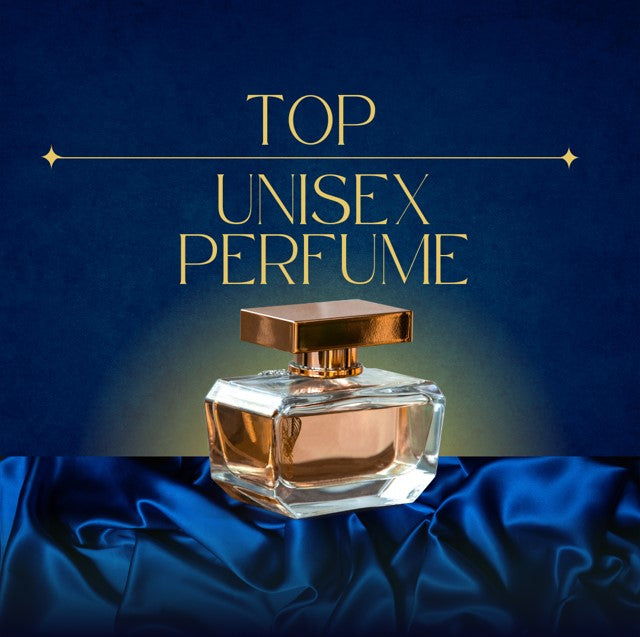
Perfume Oil vs EDP: Understanding the Key Differences in Fragrance
Choosing between perfume oil and Eau de Parfum might be harder, especially when you want to find the perfect scent that fits your personality. Although these two are among the most popular types of fragrances, they are actually pretty different in composition, application, and overall experience.
These differences will affect the longevity, intensity, and the profile of your perfume. So, what exactly makes them different? And how do you choose one over the other?
In this article, we take a deep dive into some of the key differences between perfume oil and EDP. From fragrance concentration to longevity, this will give you a clear vision of which option best suits your needs and preference.
What is the Difference Between Perfume Oil and EDP?
The main difference between perfume oil and Eau de Parfum is in their ingredients. Perfume oil is usually alcohol-free, highly concentrated with essential oils. In EDP, a blend of oil and alcohol results, hence lighter in texture and evaporating faster.

Perfume oils are generally much more intimate because the fragrance of these perfumes remains closer to the skin. They are generally less likely to project across a room, but they can give a much longer-lasting fragrance because of the high level of oil concentration that they contain. EDPs contain alcohol, which provides more sillage for the scents-how far a scent will travel-but EDPs may not be as long-lasting as oils.
What is the concentration of fragrance in perfume oil?
Perfume oils contain around 20% to 30% concentration of fragrance, which is dramatically higher than any EDP. Hence, because they have more essential oils, they work for hours on the skin and do not have to be reapplied every few hours. How would that difference in essential oil concentration affect the scent profile?
Perfume oil has a deeper, more muted nose. Since oils have a slower evaporation rate, the fragrance takes longer to put down on the skin and releases its varied notes over time. EDPs are generally quite strong at first because of the alcohol content, which helps the fragrance projection, but the fragrance may wear faster than the oils.
How Does Longevity Compare Between Perfume Oil and Eau de Parfum?
Longevity is perhaps the greatest determinant between perfume oil and EDP. In most scenarios, perfume oils are usually free from alcohol additives and contain a higher concentration of fragrance; hence, they can last in the skin for quite some time.
Whereas the EDP is still a power but will evaporate because of the alcohol base, which is contained within. Thus, its longevity in the skin is not as long-lived.
Why do some perfumes last longer than others?
The longevity of perfume depends on the concentration of fragrance oils, the presence of alcohol, and the interaction between the perfume and your skin's chemistry. Higher concentrations of oils, such as in perfume oils, generally last longer when on the body.
What decides how long a particular scent lasts?
Skin type, environmental conditions, and concentration of essential oils in the perfume contribute to how long a fragrance lasts. Oil-based perfumes tend to do very well on dry skins in that their contents can lock moisture in, while EDPs tend to evaporate on oily or sweaty skin much quicker.
Do oil-based perfumes last longer than spray perfumes?
Yes, oil-based fragrances last longer compared to spray perfumes, like EDP. That's because there is no alcohol in them, and this makes the oils bind in your skin, releasing the fragrance for a more extended period.
What Are the Concentrations of Perfumes in Different Types of Fragrance?
Fragrances come in different concentrations, each derived from highly concentrated perfume oils to lighter ones like Eau de Toilette and Eau Fraiche. As a general rule, the higher concentration of essential oils, the stronger and long-lasting the fragrance will be.
What concentration of perfume is in EDP vs EDT?
While EDP has about 15% to 20% essential oils, the EDT contains only about 5% to 15%. Consequently, the former is much more potent and has a longer-lasting scent than the latter.
How does the concentration of essential oils impact the strength of the scent?
The larger and more lasting the fragrance, the greater the level of essential oils in the perfume. That is why perfume oils are considered the most powerful because they contain the highest amount of oil. EDPs have slightly lower concentrations and represent a balance of strength and wearability.
At what oil concentration level is the difference between perfume oil and EDP?
Perfume oils generally contain a higher percentage of fragrance oils, about 20%-30%, while EDPs contain 15%-20%. This higher concentration in oils provides for a longer-lasting, more intimate scent profile.
Which is Better: Perfume Oil or EDP?
Personal preference, lifestyle, and skin chemistry are all important factors to consider when choosing between perfume oil and EDP. Each has its merits and is suitable for different occasions.
Advantages of fragrance oils
Fragrance oils have a more concentrated and longer-lasting smell, generally being closer to the skin. It's great for those who prefer a moderate scent or have sensitive skin as it does not contain any alcohol and thus tends to cause less irritation.
How do oils work with the skin in correspondence to perfumes?
Skin chemistry plays a big role in how a fragrance smells and how long it lasts on you. Perfume oils tend to blend in with your skin's natural oils, creating a unique scent that seems to last longer rather than alcohol-based fragrances, which may evaporate faster on certain skin types.
In what cases is it better to go with an eau de parfum over a perfume oil?
Eau de Parfum works best for anyone who likes a stronger fragrance that projects more. It is, however, a bit too formal to wear during life's casual moments, but it will prove just right for your formal events in which you need your scent to have an effect. The perfume oils are good for intimate and daily use.
Can Perfume Oils Be Combined with Other Fragrances?
This layering of different smells can make one unique and personal to their identity. Yes, mixing perfume oil and sprays together is perfectly okay, but one has to be very careful not to overload the senses.
How to layer different perfume types for a unique smell?
That means putting on the perfume oil as a base, preferably on pulse points such as the wrists and neck. After the oil has absorbed into the skin, lightly spray an EDP over it to give the depth and complexity. The oil will anchor the fragrance, while the EDP adds projection.
What are the best ways of blending fragrance oils?
Mix and blend fragrance oils using complementary fragrances to avoid clashing. Select oils with related or harmonious notes, such as a floral or woody EDP that complements each other when mixed with a vanilla oil. Always test on a small area before committing to a combo.
Is it safe to blend the oil-based fragrances?
Layering scents is one of the best methods of coming up with a unique signature blend. You just want to be sure the scents are complementary to each other. Combining conflicting notes-a heady musk with a citrus-based fragrance, for instance, can all too often clash in such a way as to result in an unflattering, and even overwhelming scent.
Which other types of perfumes are in fashion nowadays?
Currently, there is an increased demand for niche fragrances and unisex scents. Consumers are moving more toward bespoke, individual combinations that provide something slightly alternative to more mainstream fragrances. These stress natural ingredients and 'green' packaging.
Final Thoughts
Understanding the differences between perfume oil and Eau de Parfum can help you make your selection in the future. If you are after longevity and closeness, then you need the former. If you want projection and a really apparent scent, you need the latter.
Both are meritorious, and your choice depends on your preferences, the occasion, and skin chemistry. Whichever you choose, experimenting with layering and understanding the fragrance oil concentration will enhance your scent experience.
Frequently Asked Questions
What is the difference between Eau de Parfum and Eau de Toilette?
Eau de Parfum has a higher degree of fragrance oils-15%-20% than that of Eau de Toilette, 5%-15%, thus making it stronger and longer-lasting.
Can perfume oils irritate the skin?
Perfume oils are generally far safer on sensitive skin as they do not contain alcohol; however, certain essential oils can still cause irritation with particularly sensitive skins.
How does the longevity of perfume oil compare to EDP?
Perfume oil will generally last much longer than EDP as it is highly concentrated with oils and does not have alcohol, which slows down the evaporation process.
Does layering perfume oil over EDP work?
Yes, layering will offer a deeper and longer-lasting fragrance. Applying the oil first then spritzing the EDP will have better results.
Are oil-based perfumes more suitable for dry skin?
Yes, oil-based perfumes are more likely to do well on dry skin because the oils will help lock in moisture and extend the fragrance.




Leave a comment
This site is protected by hCaptcha and the hCaptcha Privacy Policy and Terms of Service apply.